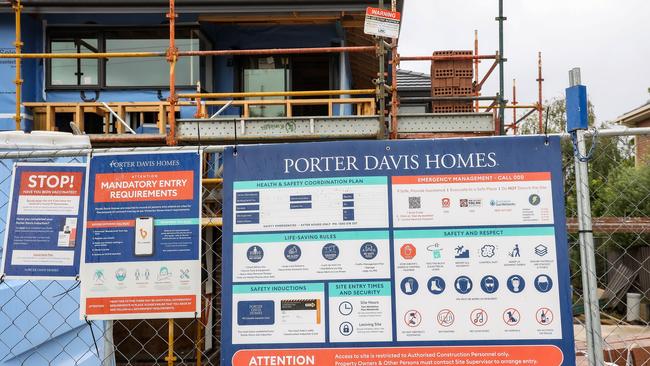ASIC data shows 5520 liquidations and administrations nationally in 2022-23, up 17.2 per cent
Australian businesses have a tough few months ahead after a spike in company collapses in the past 12 months. SEE THE FULL LIST

Struggling business owners face a “horror show” over the coming months as the taxman circles and operating costs spiral in the wake of a 17 per cent spike in company insolvencies over the past financial year.
The lingering impact of the Covid-19 pandemic and skyrocketing inflation and interest rates sparked a wave of company failures across Australia with failed businesses owning hundreds of millions of dollars.
According to indicative Australian Securities and Investments Commission data there were 5520 administrations and liquidations nationally for the financial year ended June 30, 2023, a 17.2 per cent increase from 4710 the year before.
In Victoria the numbers were up 39 per cent to 1476, while Queensland rose 23.5 per cent to 1004 and NSW added 2.5 per cent to 2153. WA was up 53.5 per cent to 485 and ACT by 5.8 per cent to 128.
In South Australia the numbers were down 5.4 per cent to 212 and in Northern Territory by 34.4 per cent to 21. In Tasmania insolvencies were flat at 41 for the year. The final national tally will be higher because the preliminary data does not include companies where no state is recorded.
Home builders Porter Davis, Hallbury Homes, PBS Building, Oracle Homes, LDC and engineering contractor Clough Group were some of the casualties but the contagion has spread to other sectors.
Transport giant Scott’s Refrigerated Logistics, co-working company Victory Offices, Brisbane-based rapid Covid testing business Ellume, ASX-listed printing and marketing business Ovato Limited, food delivery company Deliveroo and weight-loss icon Jenny Craig were just some of the big names who called the administrators in 2022-23.
The alcoholic beverage sector also took a hit, with online spirits marketplace Gintonica – which raised almost $250,000 last June in a crowd-funding campaign – the latest victim. It was placed in administration last week.
In February this year one of the nation’s largest craft brewers, Tribe Breweries, fell into administration – later being saved through a deed of company arrangement.
The impact of the multi-billion dollar bankruptcy of US-based global crypto exchange FTX had a large impact on the Australian sector with Digital Surge calling in administrators but it has avoided liquidation after a rescue package.

Revive Financial head of business restructuring and insolvency Jarvis Archer said company directors who received penalty notices from the Australian Taxation Office (ATO) last year but did not act on them were at particular risk.
“There’s a horror show coming to light for directors who received director penalty notices in 2022 that have since expired,” he said.
Mr Archer said that increasingly, small business owners are being forced to get second jobs to prop up their business or pay their rent or mortgage.
“It’s a grim reality that after three years of uncertainty and difficult trading conditions, there’s no prospect of things improving in the foreseeable future,” he said.
“During increasingly difficult circumstances, without hope, it’s hard to continue trading.”
WCT Advisory managing partner Andrew Weatherley said the wave of collapses will continue.
“We’ve seen an increase in the number of people wanting to know what their options are or they’ve had enough and want to put their companies in liquidation and close their businesses,” he said.
“It’s very hard out there. It’s been a difficult slog for quite a while and people are getting to the end of their tether.”
Mr Weatherley said the construction sector still took up most of the failures but in the present economic climate of interest rate rises and inflation will put increased pressure of the food service and retail sectors.
“It’s a real challenge having struggled over the past two to three years with out making any money and now there is the pressure on discretionary spending, especially in their target markets,” he said.





